
Agency means a condition of being in action, instrumental, or possessing some kind of power. It can incorporate not only making decisions, but the belief that we (or our characters) have choice. If we think about it, if there aren’t options, then by default, our characters have no power and are not making any decisions. They are the flotsam and jetsam being flung along by the currents of Fate.
Code for “boring.”
I’ve been editing fiction for over twenty years, and one of the biggest problems I see with new writers is that the “story” is really just a series of bad things happening. There is no agency. The character is totally reactive. To a degree, this is fine in the opening salvos of the story.
To a degree.
If we parse apart novel structure, what we will see (especially with good stories) is that there is a steady progression of agency that flows in tandem with rising pushback, higher stakes, and a steadily compressed ticking clock.
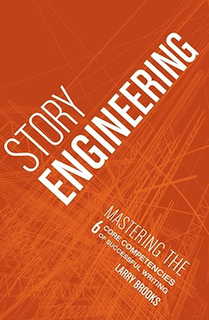
My favorite writing instructor for plot is Larry Brooks. His “How To” Story Engineering, for me, was a game changer. For years I knew how to edit a plot, but when I sat down to write, everything just sort of fell apart. I’d read craft books or take classes and, what seemed so simple and doable, always turned to utter mush roughly 25,000 to 30,000 words in.
Many of you might know what I am talking about.
You come up with a BRILLIANT story idea and begin writing. The first 10,000 words are amazing! The words flow and you write until you think your hands might fall off.
By about 15,000 to 20,000 you begin losing steam.
After 28,000 to 30,000 it starts feeling like it might be easier to do brain surgery from space…with an egg beater. #KillMeNow
Why is that?
Structure and Agency
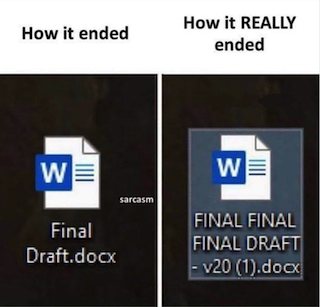
I love, love, love the way Larry teaches us how to think about plot (and recommend the book, obviously). He gave me a simple way of thinking about all my stories in a way that keeps me always moving forward.
Additionally, if I do get stuck, I can quickly diagnose WHY and where and how I am going wrong.
I prefer to think of story in five acts (just an expansion of Aristotelian three-act structure).
The opening is Normal World. This is usually pretty short, especially in our modern age where audiences have the attention span of a crack addicted fruit fly…that also happens to have severe ADD.
Yet, Normal World is CRITICAL. This is where we (the audience) will meet the protagonist we are supposed to care about enough to dedicate time, money and attention we don’t have for an average of 12-15 hours. It is also where we get an idea of the problem this character will have to face and overcome to be rightfully called a hero.
In the LOTR (Lord of the Rings), we begin in the Shire. Why? Because we have to actually care about the Hobbits and the Shire. We cannot be vested in a people and place we don’t know.
The inciting incident, introduces the core story problem. If there is no hint that Sauron is alive and well and living in Beverly Hills Mount Doom, there really is no point to us even meeting Gandalf and the Hobbits. But keep in mind, no decision has yet been made.
When Gandalf sticks a ring Frodo inherits into the fire, he only believes the ring possibly maybe might be THE RING. For Frodo and Samwise, the adventure has not yet begun.
In Normal World, the character will have very little to no agency…until…
Turning Point to Act One: Agency Sparked
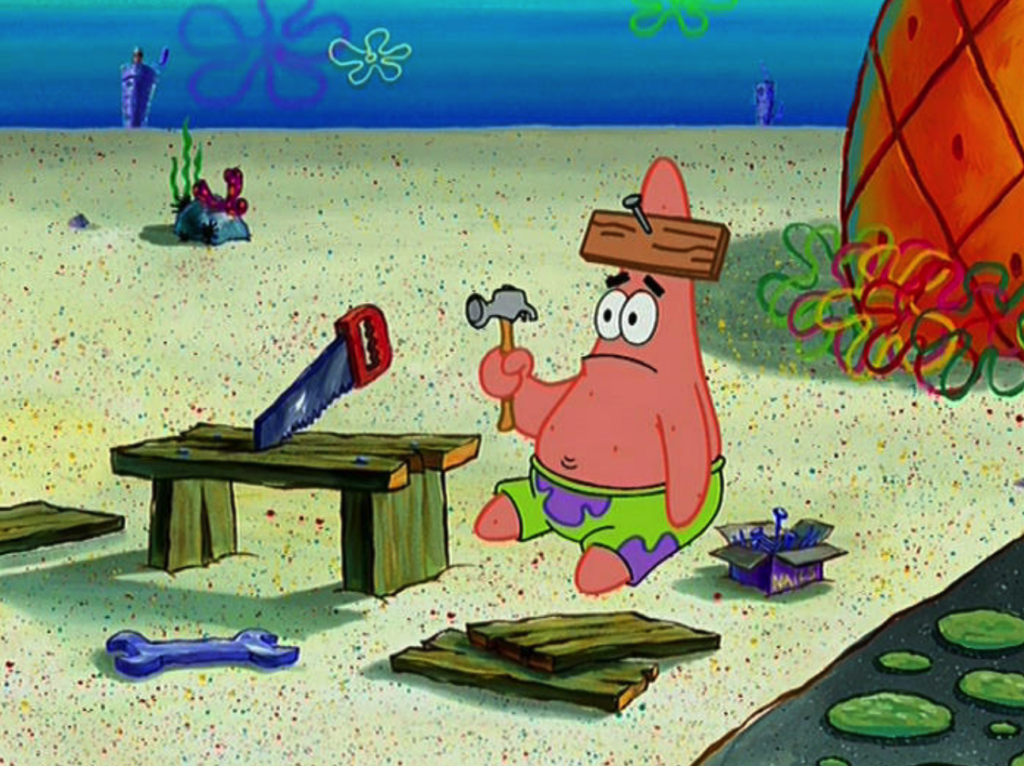
The inciting incident reveals a fork in the road. This is where the MC’s life bifurcates. One road leads to retaining the status quo. The other road leads to adventure.
Yet, the character must choose of their own free will to set out on adventure.
Events cannot simply fling them ahead. Granted, they will be signing up for far more than they can handle, but (at the time) they don’t know that. They also need to have some vague idea of what the adventure entails. To toss characters out into the world and push them from point to point is NOT dramatic tension.
It’s soap opera writing.
Which is fine for fan fiction (episodic writing), but not great for novels, novellas, short stories or screenplays.
When Frodo and Samwise leave the Shire, their goal is NOT to destroy the Ring of Power in Mount Doom. It is far simpler. It is simply to meet Gandalf at The Prancing Pony. While scary and out of the comfort zone, it is (to them) still doable. Additionally, they know the adventure is in some way tethered to a ring dangerous enough to even scare the great Gandalf the Grey.
Act One: Running

In Act One, our MC will be largely reactive. They don’t yet believe they have agency, though they still must exercise it for a good story.
For instance, Gandalf doesn’t force Frodo and Samwise to meet him. They agree to leave the safety of the Shire.
Additionally, it isn’t Frodo and Samwise’s fault they miss Gandalf at the rendezvous point. However, they must choose to trust Strider. They have to choose to either stay at The Prancing Pony (or return after the Black Riders have left and hide) OR to follow a stranger they don’t know into the wild.
We authors must always provide opportunities where, if the character(s) makes a decision, one decision pushes the narrative forward and the other ends the story.
What Does this Look Like?
For instance, in the movie Labyrinth, we meet Sarah faffing off in a park in costume reciting lines from a play. In Normal World, Sarah is flaky, entitled, immature (but also clearly hurting).
The inciting incident is when she discovers her missing teddy bear and decides to be emotional and take her out anger on her infant brother. She chooses to recite the call to the Goblin King to take her baby brother.
Granted, she has zero clue it will work, BUT when it does work and David Bowie materializes—looking far too sexy for a grown ass man in makeup and big hair—and offers her a chance to have all her dreams…the story truly begins.
One decision lets him rule her, give her all she ever desires…if she only turns over her baby brother. The other decision is to race against the clock and see if she can rescue her brother from the center of the labyrinth.
Obviously, if she gives up baby brother, the story ends. And an entire generation of preteen girls, myself included, took 25 years to work out why she didn’t grab the deal.
Quick Note on Labyrinth
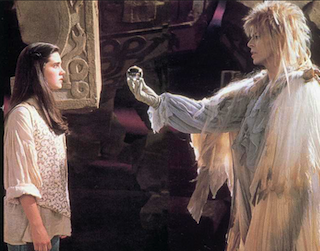
Movies can be a lot of fun to study, especially good ones. If you haven’t seen Labyrinth or have slept since then, I recommend going back and watching. I learn something new every time. In fact, the last time I watched it I learned a whole new level I’d missed, but had been there all along.
Roll with this and indulge me, it’s actually cool/important.
Sarah arrives late to babysit her brother. We (the audience) are somewhat misled. The stepmother points out exactly what Sarah’s problem is. Sarah is stuck and not growing up normally. The stepmother tells Sarah that she can say if she has plans, that they want her to have plans and she should have her own plans, but Sarah balks. She treats her like the evil stepmother out of a storybook no matter what she says.
Dad backs up stepmother. This event is what drives Sarah into a temper tantrum.
But pay attention.
Dad is obviously remarried and remarried long enough to have an 18 month old baby. One would assume, given the times, that Dad and Stepmother had dated and married before the 9-10 months to have the brother. This means a minimum of 2.5 to as much as 3 or more years has passed since Sarah’s mother was in the picture.
My entire life, I assumed Mom had died, since Hollywood loved killing off parents. Watch the introduction when she is in her room. Played at normal speed, we see playbills with the mother and even with Sarah.
Okay, so mom was an actress and daughter is a theater nerd following in mom’s footsteps.
Or is she?
Now PAUSE the MOVIE
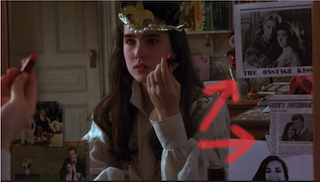
Now, go back and rewatch and hit PAUSE. If you do this, the entire story changes. Pay attention to the newspaper clippings taped in her vanity mirror, the clippings that at normal speed I’d assumed were likely an obituary or newspaper articles about a famous but now dead mother.
Whose face do you see?
JARETH, the Goblin King.
In among the articles and scrapbook clippings a whole new story emerges.
Jareth looks just like the mother’s costar. What now seems far more likely is the mother ran off with another man and abandoned her daughter at roughly age 12-13…exactly the time she should have started transitioning into adulthood.
This is a whole other level of emotional damage.
It now makes perfect sense why Sarah is emotionally moored in childhood. Additionally, a sparkly, charismatic man offering to take care of her if she sacrifices a child in her care, has a whole new twist.
If great movies understand the power of Normal World, we should too. Every story should introduce the Big Boss Troublemaker right from the start.
In Labyrinth we get this in the park where she’s reciting the final lines to take down the Goblin King. BUT, we ALSO see him again in her bedroom in the moments before she recites the incantation that sets off all events from there.
Act One: REACTIVE
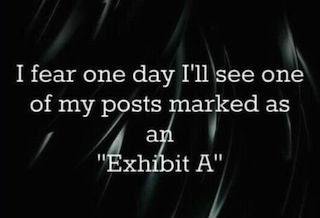
Once our MC decides to step out on adventure, sure, there will be a lot they cannot control. Yet, they still must have agency, meaning options.
New writers can be very bad about making the MC far too passive. They have no other choice but to do X, Y, Z. This is author intrusion.
Now, I am not suggesting to make the options silly. The Hobbits aren’t choosing between trusting Strider and certain death. They could circle back to the inn for shelter or decide to hide in the woods and wait it out for Gandalf. The choices might suck, but they are at least doable.
Agency is limited in Act One because not only should we have a plot arc, but a character arc. If characters are too perfect and can handle everything the story throws their way with dignity and aplomb? That is a snooze fest.
There has to be something emotionally undeveloped that must change by the end of the story.
For the Hobbits, they believe their happiness and fulfillment lies in adventure, in anywhere BUT the Shire. The very place they despise for being boring will be the one place they’ll (eventually) be willing to sacrifice their lives to save from certain destruction.
For Sarah, she’s stuck in nostalgia and is refusing to evolve. Again, when she steps into the magical realm, who does she meet? Hoggle. Again, Hoggle tells her what her problem is, but she is not yet matured enough to appreciate the advice. He tells her, “You take too much for granted.”
Taking things for granted is a hallmark of childhood. It is, in fact, a mark of ZERO AGENCY.
Act Two: Warrior
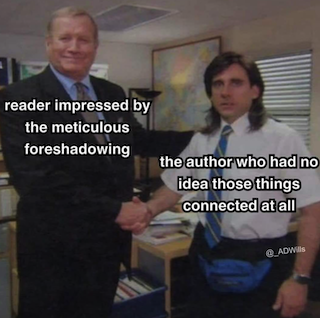
Act One is relatively short. How do we spot the turning point to Act Two? This is when the MC shifts from running to fighting. In Act One, circumstances bigger than them are beating the hell out of them. They fight back but are really hitting in the dark. They are unaware of what the larger story problem is and probably still unaware of their character flaws that are holding them back.
Act Two is when some sort of event or information changes the MC’s perspective and their level of agency. They go to being a mix of reactive and increasingly proactive.
When the Hobbits take refuge with the elves, Gandalf confirms that Sauron is back and there is only way to stop him. At this point, the Hobbits still can go BACK to the Shire. Rather, they willingly decide to keep going. Frodo will bear the Ring and Samwise will act as a helper/bodyguard.
In Labyrinth, Sarah is stuck in an oubliette (a small prison cell). The adventure has effectively ended. Hoggle comes to her aid and is happy to lead her back home and out of the labyrinth. If she goes home, story over. Yet, we are in Act Two. Sarah bribes Hoggle to help her solve the labyrinth.
She has effectively taken on a new level of agency.
Act Two will be the longest act. Again, I recommend Story Engineering. Larry has some great diagrams and formulas and examples. But, in Act Two, the thing we must remember is our characters must have increasing levels of agency.
NO CHEATING!
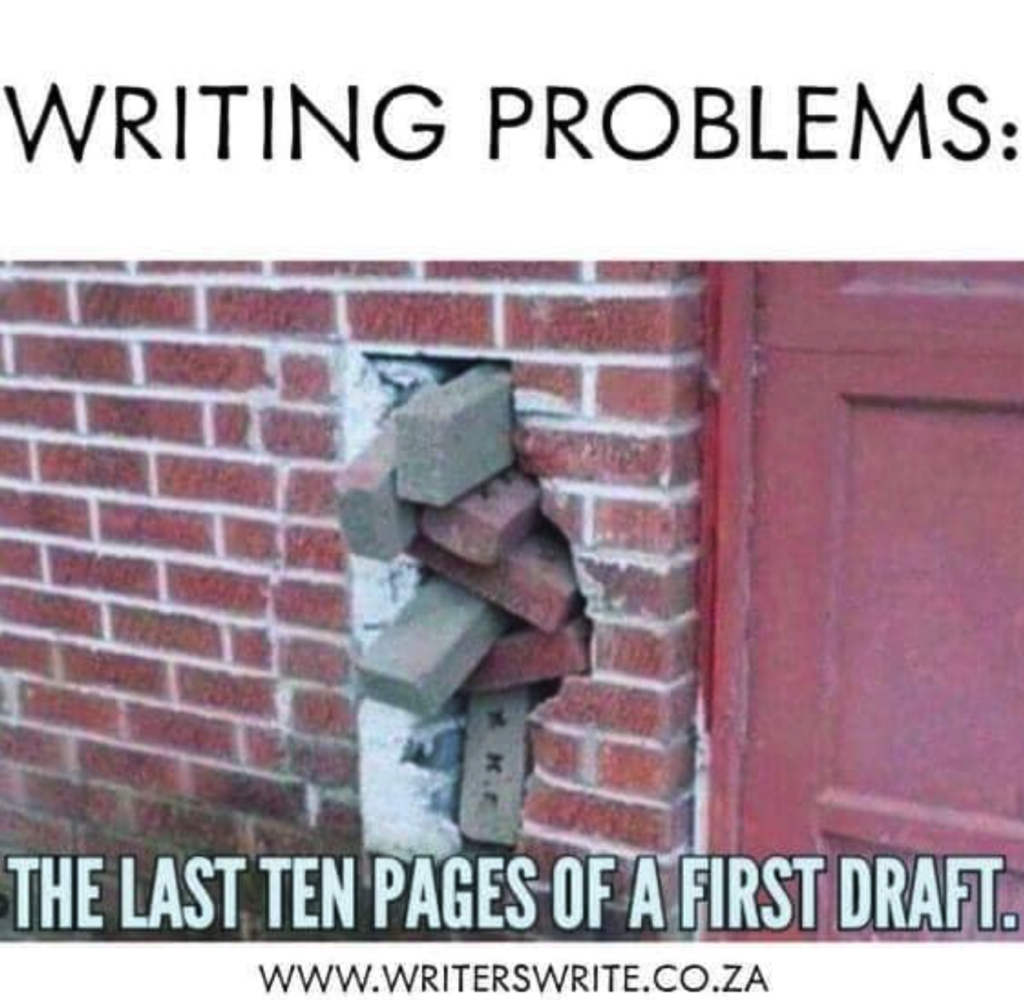
Maybe your character is far too perfect. Or the opposite. They don’t have any of the right answers…they are just luckier than a leprechaun dressed in a coat made of rabbit’s feet.
Bad thing happens—Oh no what will we do?—then some existing character or new character rescues them out of the mess at zero cost and with no effort from them.
NO.
This is the part of the book where many new writers decide to leave a convenient journal, video, have a new character appear with all the abilities and answers. NO.
Y’all might know I love horror (supernatural type books), and I read…a lot. Recently, I listened to a book with a premise that had a lot of promise. I couldn’t finish it.
The characters had no agency. Instead of them actively having to find answers to why crazy/life-threatening stuff was happening in their basement, the author used a crap ton of seriously convenient “dream sequences” that served as flashbacks to spoon feed vital details.
NO.
Flashbacks are a sign of weak/lazy writing.
Before anyone argues with me, check out Why Flashbacks Ruin Fiction and Time as a Literary Device. Can we mess with time? Sure! I love doing that. But like all things in writing, the rules exist for a reason. There is a certain WAY to go about using time.
Tossing in hidden boxes of journals or videos slipping in dream sequences absolves the characters of responsibility. In short, it takes away agency. Handing characters the answers all-but-spelled-out is cheating.
Bright Idea Fairies and Agency
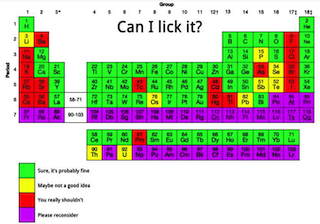
Since Act Two IS so long, you’ll have what are called “pinch points.” This marks how our character is not only progressing along via plot, but how they are emotionally maturing. Since they are not yet fully evolved, they’ll try to rely on their old ways of thinking. They haven’t yet come to understand that their old habits/worldview etc. is precisely part of the problem.
Which is why, as they are trying to solve the core story problem, they will have what I call “bright idea fairies.”
Usually the “bright idea fairy” will be in some way related to the character flaw. If your MC is a workaholic who needs to appreciate life and family, expect them to orchestrate events where they can have BOTH (Inviting the wife and kids to a company event).
Maybe your MC is a fighter. Their instinct will be to fight. If they hide and avoid, they’ll look for better ways to hide and avoid. If they’re a control freak, they’ll keep white-knuckling and refuse to trust others and delegate.
In Labyrinth, Sarah is taking on increasing levels of responsibility, but not enough. She is still far too reliant on her allies.
Bright Idea Fairies (BIFs) are directly responsible for the False Victory and, by default, the Darkest Moment.
The False Victory is the Big Boss BIF, the brightest of the Bright Idea Fairies. It is the last event that should prove to our MC they must make those final changes that transform them from a lowly MC (protagonist) into a hero.
The Darkest Moment is where everything has failed and the protagonist is dumped unceremoniously at the final crossroad. One road leads home (and to failure), the other plunges ahead into certain death (or at least implied certain death).
Agency Unleashed: Act Three HERO
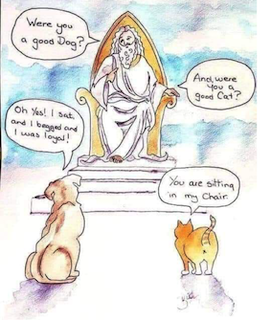
After the darkest moment, we usually see the rally of the allies. Once everything has been stripped away, what matters is restored. HOWEVER. The difference here is that the hero finally understands they must go it alone. Only ONE character can take on the Big Boss Troublemaker.
***Or two if this is a Buddy Love structure like LOTR or a romance. Yet, the two have effectively become one. In romance, guy and gal must come together if they hope to be victorious. Yes, they can spend the entire book driving each other bonkers BUT they must come together like VOLTRON in order to win.
This is the climax of the story. The odds should be total sh!t. In fact, the worse the odds, the better the story. That and time should be almost out. If the MC fails, super bad things need to happen or we will not care.
These can be large-scale catastrophic implications. Sauron rules Middle Earth and destroys all Frodo and Samwise hold dear, OR personal catastrophic implications. Sarah loses her little brother forever.
By Act Three, your character has ditched the old self and is now battling the BBT (Big Boss Troublemaker) on new terms. Frodo and Samwise willingly accept a suicide mission to protect the Shire.
Sarah goes in to face Jareth on her own. How does she win? She claims her AGENCY.
“You have no power over me.”
Once she finally realizes that Jareth only has as much power as she has been willing to relinquish, he loses his hold over her.
The Denoument: Agency Realized
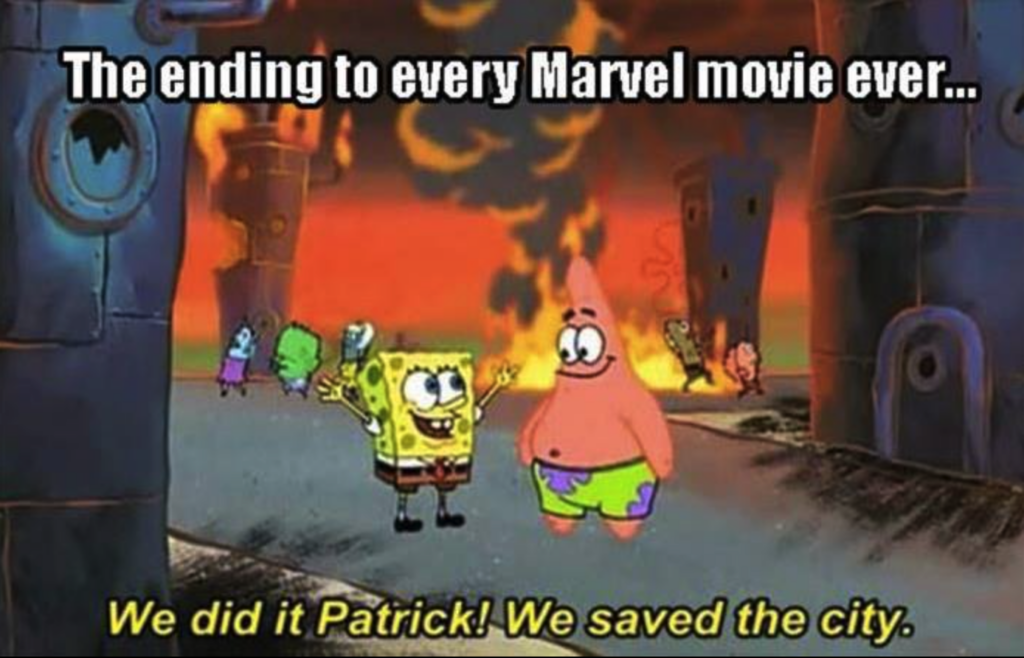
After the battle is won, the world might be in shambles but everything has changed for the better. Yes, the end of every Marvel movie means some big city is reduced to rubble, but the greater threat has been neutralized.
At the end of LOTR, we see an interesting bookending in the movie.
In the beginning, the Hobbits (mistakenly) believe adventure outside of the Shire is the key to personal fulfillment. They are naive and childlike which is largely why Sauron never offered them jewelry.
He underestimated that the very qualities that nearly get them killed (frying bacon on a mountain with dead kings on their trail) is also what makes them remarkably resilient to the sway of the Ring (and arguably the only reason they succeed when all other races have failed).
Yet, there is a cost.
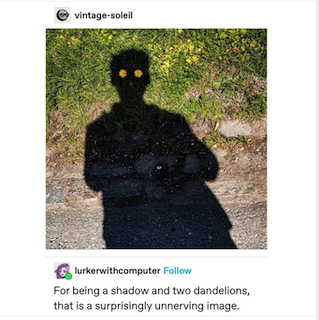
Unlike the opening in Normal World, our heroes aren’t bouncing along getting into mischief. They sit, somber and broken at a table, forever changed. Their fellow Hobbits laugh and drink and joke in the background, oblivious to the sacrifice these Hobbits made to make that a reality.
They have learned that self-serving adventure is not the secret to happiness, rather sacrificial love is the key to joy.
The book is vastly different than the movies. In the book, the Shire does not survive in tact.
It is razed, and the Hobbits killed or enslaved. Life is no longer beautiful and innocent. Those in the Shire live in fear and are barely surviving.
Our band of heroes return expecting a hero’s welcome only to come to the horrible realization the battle is far from over. The biggest fight is yet to come. They must liberate the Hobbits and rebuild what remains of their home.
That said, while everything they knew and took for granted is obliterated, they can finally rebuild in a world that is no longer under constant threat.
Unlike the other Hobbits who have bowed down to their oppressors, Frodo, Samwise, Merry and Pippin pass on their lessons and show their fellow Hobbits they have more power than they know.
Using Agency in Our Writing

The key thing to remember about agency is that our character must always be actively involved in the decision making process. They can and WILL make a lot of bad decisions. Yet, over time, as they mature, these decisions will vastly improve.
I use this when I am writing. It doesn’t matter if we are a plotter who loves outlines or a pantser (write by the seat of our pants). In fact, for the pansters here, having an understanding of agency is KEY. It’s likely even more important since we rely more on intuition to write.
I am a Plotser
That means I create a log-line that says, overall, what my story is ABOUT. But it serves as a guideline to keep me pointed in the correct direction. If I know (usually by word count) that I am well into Act Two, then I know when my MC is being too passive.
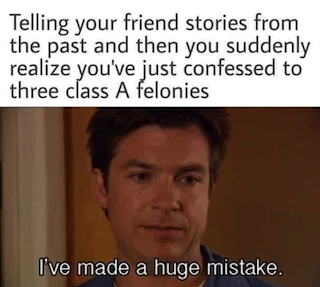
Are they relying too much on others? Do they still react to everything as opposed to becoming increasingly proactive? Am I offering actual choices to my character, or am I just letting them drift along the riptide of bad situations? Am I cheating and allowing my characters to rely too much on luck?
Trust me. All these years later, I still have to delete sections because I recognize either the character is too evolved for so early in my story OR they need to do better because they can’t be so passive and dull-witted halfway into Act Two.
I hope you will now watch movies and read books with fresh eyes. Being a writer is a fabulous calling because watching movies, series, and reading books are all considered professional development.
I guarantee that if you see a story that breaks these rules, it is probably a story you either struggled to finish or didn’t like (but might not have been able to articulate WHY you didn’t like it.)
What are Your Thoughts?
Does this idea of agency help you better understand story flow? How you can use it to ratchet dramatic tension? Few things will make us turn pages like a character who has decisions but is making the wrong ones. Conversely, few things will turn us off like a character who keeps making the wrong decisions and fails to ever learn.
Does this help you in a place where you are stuck? Maybe offer some insights into how you can up the stakes? Can you now see better why you loved some stories or grew tired of others?
If we think about agency in terms we are familiar with, what comes to mind. Literary agent? This is a person with power we don’t have to make decisions where we cannot. Now zoom in on that feeling and make sure it’s in your stories.
I love hearing from you!
And remember, my perennial author branding book, Rise of the Machines: Human Authors in a Digital World and my mystery thriller The Devil’s Dance are both on sale on Kindle right now for only .99. Also please grab a copy of Larry’s book! Especially for those who struggle with plot.
Whether it is comments, shares, sales, or reviews, these are the things that keep us content producers (and authors) going and able to keep delivering. I always appreciate your support and love being able to keep doing this for you!
The post Agency: The Critical Component of ALL Great Stories appeared first on Kristen Lamb.
